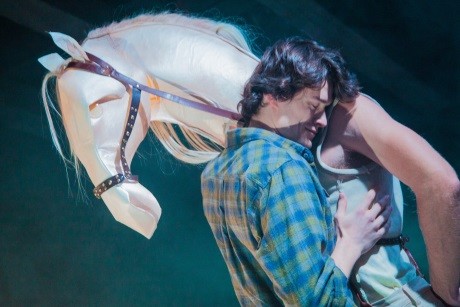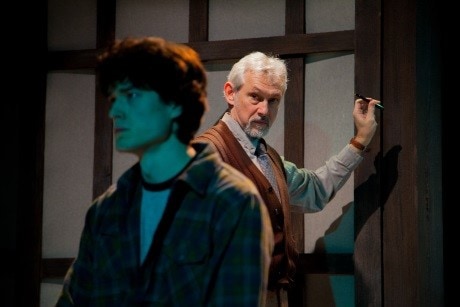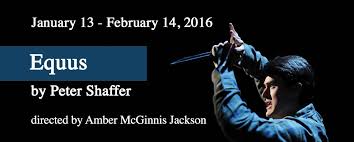Since Peter Shaffer’s Equus made its striking return to the Anglo-American imagination in 2007, when then-17 year old Daniel Radcliffe stirred international controversy by appearing nude in the West End revival, the play has achieved a deservedly renewed reputation for its complexity and emotional brutality. Constellation Theatre Company and Director Amber McGinnis Jackson have now contributed to the venerable recent history of Shaffer’s work by mounting a suspenseful, intriguing, and provocative production of Equus that is as beautiful as it is disturbing.

Equus, first staged in 1973 and the subsequent winner of both the Tony and Drama Desk Award for Best Play, is the story of disturbed teenager Alan Strang (Ross Destiche), whose obsession with horses leads him to commit a horrible act of violence. As renowned child psychiatrist Martin Dysart (Michael Kramer) peels back the layers of Alan’s tormented psyche, Dysart himself begins to question the legitimacy of his occupation and to envy Alan’s passionate sense of “worship”, despite its bloody ends.
Ross Destiche dives headfirst into the convoluted angst and shame that tortures Alan Strang. In this day and age, where mass shooters and jihadists too often turn out to be very angry young men, Destiche’s performance struck a painfully accurate nerve. Most compellingly, Destiche never foregoes portraying the painful vulnerability that underlies all of Alan’s sturm und drang, as it does for many angry and hurt young people.
One cannot imagine a more perfect foil for the tempestuous Alan Strang than Dr. Martin Dysart, a Van Helsing like man of science who skillfully draws the truth out of Alan even as he himself struggles with hidden doubts about his professional and personal life. Michael Kramer is an excellent Dysart with a keen eye for specificity and rhythm. It is mesmerizing to watch as Dysart gradually slides from a buttoned up professional curiosity to a straining obsession whose intensity matches that of his young patient.
Equus is no doubt dominated by the performances of Destiche and Kramer, but the supporting cast plays an important role too. Laureen E. Smith as Mrs. Dora Strang and Michael Tolaydo as Mr. Frank Strang are both excellent in their portrayals of a painfully normal British couple who, despite being a bit negligent and emotionally distant, are basically normal parents. The one fly in their Anglo domestic bliss is that Mrs. Strang is a devout Christian, and Mr. Strang is an ornery atheist.
Even as it becomes apparent that much of Alan’s current psychological state may indeed have been patched together by dear old Mom and Dad, Smith and Tolaydo both attack their roles with a sincerity and complexity that makes it impossible to assign them all blame. Indeed, Laureen Smith has a particular scene stealing monologue where she defends herself against perceived attacks by Dr. Dysart by declaring that Alan is his own person, and that only he is responsible for what he has done.
Several other ensemble members have standout moments, including Ryan Tumulty (Horseman) as the strapping equestrian who kicks off Alan’s lifelong fascination with horses; Emily Kester (Jill Mason) as the unfortunate stable girl who attempts to seduce Alan, with disastrous consequences; and Colin Smith (Harry Dalton), whose gruff stable owner is a nice counterpoint to the loftier elements that dominate the play elsewhere.

Of particular note is the ensemble of horses themselves, who, despite being objectively ridiculous in skinny white jeans and brown wedge high heels, manage to be both beautiful and terrifying in precisely the way they are supposed to be. The six member ensemble, which, plus the aforementioned Ryan Tumulty, consists of Tori Bertocci, Gwen Grastorf, Ashley Ivey, Ryan Alan Jones, and Emily Whitworth, clips and clops their way on to the stage during key moments as a sort of menacing equine Greek chorus. Costume Designer Erik Teague crafts white plaster horse heads that are pagan, god-like, and the ensemble uses well trained movement to bring the horses to life on stage.
As is increasingly characteristic of Constellation Theatre, the design for Equus was stunning. The set, by A.J. Guban, bisects the theatre space and is made to evoke a giant, abstracted stable. The lights, also by Guban, tell a much different story, one that is bizarre and otherworldly. Both elements combine in creating an atmosphere that is at once familiar and disturbing.
Composer and Sound Designer Palmer Hefferan creates a score that is ominous and somehow religious which endows the play with a critical solemnity. Costume designer Erik Teague drapes the cast in drab browns that seem to melt into A.J. Guban’s set.
Equus is about the tension between “normalcy” and pain, about the religion-sex-pain apparatus that has been with us at least since early Christendom, and about the secretive untapped energies that lie within us all. Constellation Theatre and Amber McGinnis Jackson has crafted a production that not only examines these themes with a searching gaze and a truthful heart, but also creates an atmosphere that is tuned precisely to the uncanny tone of the script. Sexy and scary, gorgeous and disturbing, Equus is a gem of the DC theatre landscape this winter. Put on your mittens and hoof it to Source.
Running Time: Approximately two and a half hours, with one ten minute intermission.
Equus plays through February 1, 2016 at Constellation Theatre Company, performing at Source – 1835 14th Street NW, in Washington, DC. For tickets, call the box office at (202) 204-7741, or purchase them online.
RATING:





